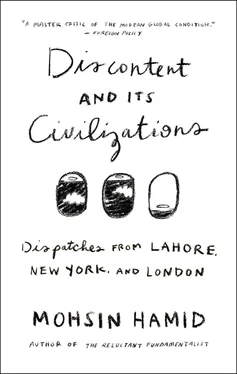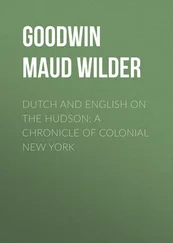Mohsin Hamid
Discontent and Its Civilizations: Dispatches from Lahore, New York, and London
INTRODUCTION: MY FOREIGN CORRESPONDENCE
ONE DAY, beside a slender stream in the high mountains, a monk met an essayist and they fell to talking. The minutes passed as they reclined there in the presence of dragonflies. It soon seemed clear to the essayist that the monk’s view of life, perched as it was upon a foundation of faith, was ripe for a good debunking.
The essayist laid out the required argument in painstaking detail, ending with these words: “Since you have no proof, I must conclude your beliefs are merely your own invention.”
“So what?” the monk responded, with a smile as steady as it was serene.
“So what? So everything. You’re a monk!”
The monk hiked up the robe he was wearing and dipped the back of one powerfully muscled calf in the water. “I invented myself,” the monk said. “Until yesterday I was an Olympic sprinter.”
The essayist stared, incredulous.
“Invention,” the monk explained, “is a blessing.”
—
GLOBALIZATION IS A brutal phenomenon. It brings us mass displacement, wars, terrorism, unchecked financial capitalism, inequality, xenophobia, climate change. But if globalization is capable of holding out any fundamental promise to us, any temptation to go along with its havoc, then surely that promise ought to be this: we will be more free to invent ourselves. In that country, this city, in Lahore, in New York, in London, that factory, this office, in those clothes, that occupation, in wherever it is we long for, we will be liberated to be what we choose to be.
When I sat down to shape this book, a collection of pieces I wrote for various publications in the fifteen years between 2000, the time my first novel, Moth Smoke , appeared, and now, which is to say 2014, I found I was content to let much of what I had written go. Many of my past pieces were, to my present eye, simply too crudely built or too blatantly wrongheaded to include. Others were too similar to each other, meaning it was better not to pick two when one would do.
What was left, the three dozen or so pieces making up the pages that follow, I wanted to alter as little as possible, so that they would read much as they read when they were first written. I have made some minor changes, probably the most significant of which are deletions of passages that seemed too repetitive, but I have done my best to avoid any major rewriting. Each of the pieces remains of its place and of its time.
Rereading them now, I am struck by how their writer, which is to say me, has changed over the years. Obviously, there have been changes in writing style and technique. But there have been other changes as well, changes in how I view the world, changes that perhaps reflect how I am in the world, and those changes remind me that I am becoming a different person, that I am inventing myself as I go along, as I suspect we all are. The novelist I am now would not today write the novels I wrote before; the human I am now might not behave as did the human I was before.
In that sense, the fragmentary and “of the moment” nature of the pieces that constitute this book brings with it, I hope, a different type of honesty than a book that is conceived as a whole and executed in a single effort. It reveals opinions and attitudes that are malleable, showing the plasticity of what in any given present moment one typically presents as a rock of certainty.
But it reveals consistencies, too, themes that reappear, again and again, in pieces written at different times, for different publications, in different places. Over the past fifteen years I have lived in three cities: Lahore, New York, and London. I have called and considered all three home. And yet, as I review the writings in this book, I recognize that I have always felt myself a half-outsider. The pieces here take different forms: some are lengthy essays, others are focused op-eds, others still are small fragments just a page or two long. But all of them, I think, are the dispatches of a correspondent who cannot help but be foreign, at least in part.
—
PAKISTAN EMERGES as a recurrent subject of mine. I have lived more of my life in Pakistan than in any other country, even if that total still comes to a little less than half. I am preoccupied with Pakistan’s future, as most Pakistanis I know seem to be, Pakistan being simultaneously an unusually troubled country and one that manages to provide many of its daughters and sons with remarkably resilient roots, roots that often endure even when the plant they belong to is removed to soil a vast ocean away.
In my writings about Pakistan over the years, I perceive an attempt at optimism, probably a little forced, and possibly somewhat misguided. I have often noted the potential for changes for the better that, in retrospect, have not occurred. And yet I think a stance of optimism is not useless. With optimism comes agency, the notion that Pakistan can solve its own problems. And a lack of agency has been at the heart of Pakistan’s failures, an impulse to blame foreign powers who, while very far from guiltless in the Pakistani context, have only secondarily contributed to Pakistan’s ongoing crises, which remain primarily of Pakistani making. My position has been that foreign powers should resist the impulse to intervene in Pakistan, and that Pakistanis should correct failed Pakistani policies and attitudes themselves rather than claim these are the best that can be hoped for given the machinations of the outside world.
I think Pakistan matters, not just to myself and other Pakistanis, nor only because it is beset with terrorism and possesses nuclear weapons, but because Pakistan is a test bed for pluralism on a globalizing planet that desperately needs more pluralism. Pakistan’s uncertain democracy and unsteady attempt to fashion a future in which its citizens can live together in peace are an experiment that mirrors our global experiment as human beings on a shared Earth. The world will not fail if Pakistan fails, but the world will be healthier if Pakistan is healthy.
Pakistan is at the forefront of the escalating conflict between Sunnis and Shias that is convulsing many Muslim-majority countries. Most Muslims worldwide are Sunnis, and acceptance by Sunnis of the rights of the largest Muslim minority group, Shias, is therefore a vital step toward building meaningful religious tolerance for all, including for targets of persecution such as Christians, Hindus, Ahmadis, secularists, and those of no religion.
Pakistan is also one of many places whose citizenry is made up of a patchwork of intermixed ethnic and linguistic groups — as are, for example, the European Union, Ukraine, Nigeria, South Africa, India, and Malaysia. Meeting the challenges of coexistence in societies like Pakistan will be critical if the twenty-first century is to avoid repeating the bloody internecine wars of the twentieth.
Sadly, Pakistan’s history these past fifteen years has not been very promising. Religious and ethnic minorities have been subjected to legal and political discrimination, targeted assassinations, and, in some cases, a level of violence tantamount to wholesale slaughter. Even more worrisome, in its resistance to pluralism, Pakistan’s trajectory has been far from unique.
—
I HAVE LIVED in Pakistan during its recent and most intense period of terrorist activity and drone strikes, in London during the years on either side of the 2005 public transport bombings, and in New York in the era that came to an end with the attacks on the World Trade Center of 2001—and so it is perhaps not surprising that what has been called “the war on terror” features centrally in these essays. Indeed, this entire collection might be read as the experience of a man caught in the middle of that conflict.
Читать дальше












